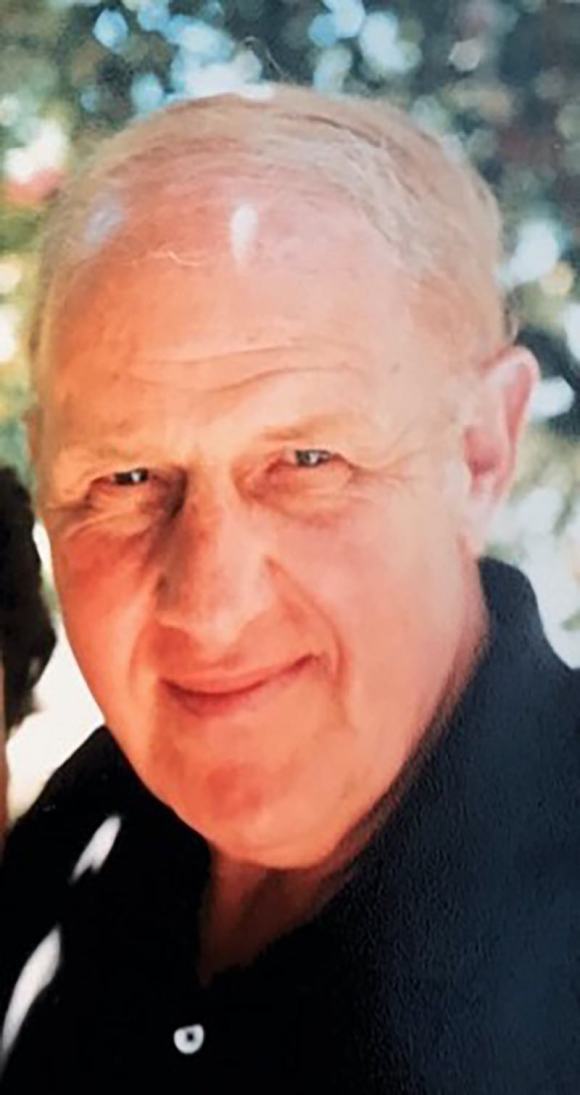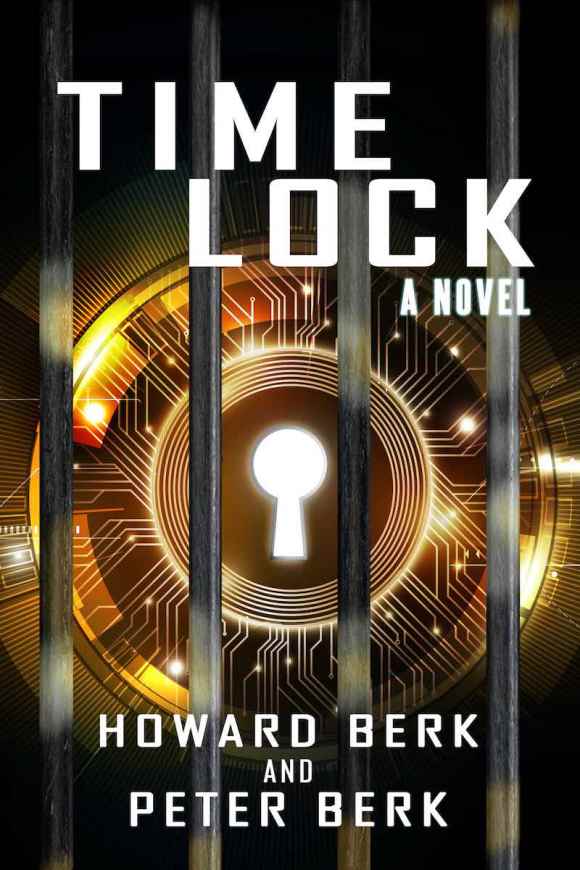While we usually get movies based on novels, and not the other way around, there have been occasions when a novel started out as a movie. Which is how we got TimeLock (paperback, Kindle), a somewhat humorous, somewhat romantic, not at all dystopian, but decidedly exciting sci-fi novel by Howard and Peter Berk that the father and son team first wrote as a movie. In the following email interview, Peter discusses what inspired and influenced this story originally, as well as how it went from being a screenplay to a novel.

To begin, what is TimeLock about, and when and where does it take place?
The year is 2032, and with crime rampant nationwide, the Governor of Maryland pushes through a radical trial program in her state designed to deter crime and punish criminals via genetic acceleration technology, which instantly ages inmates the number of years of their sentence. Telling his story in the first person is 23-year-old Morgan Eberly, who’s wrongly arrested for murder, is given a 40 year sentence, and is one of the first to be processed through the TimeLock program. Luckily for him, he escapes halfway through his processing and goes on the run — now coping with suddenly being 20 years older and a wanted fugitive. Out of options, Morgan tracks down Janine Price, the FBI agent who arrested him, and finally convinces her not only that he was innocent all along, but that something is seriously wrong with the TimeLock program.
TimeLock was originally written as a screenplay by you and your dad, Howard Berk, who’d written episodes of Mission: Impossible, Columbo, and The Rockford Files, as well as the movie Target. Where did you and your dad get the idea for TimeLock originally?
Honestly, Paul, it was his idea completely. But everyone who heard the concept thought it was, no pun intended, novel, so he and I decided to write it as a screenplay. The key for us wasn’t to make it too tech-heavy or another technology-gone-amok story, but to create a sympathetic young man who’s trying to cope with suddenly being middle-aged, running from the police, and quite likely the next target of the powers that be behind the TimeLock program — possibly including the next President of the United States.
And then what prompted you to rewrite it as a novel?
Well, I always believed in the premise, and humbly thought the screenplay turned out rather well, but in the era of remakes, sequels, and comic book film adaptations, it was difficult to get the project off the ground at the time. Even after my dad passed away, I kept trying to pitch the screenplay, but it wasn’t until 2020, when I found myself home most of the time like everyone else, that I had the idea of novelizing the script. As it turned out, I found the whole writing process extremely rewarding because it was a way of honoring my father. I then had the exceptionally good fortune of finding a publisher, IngramElliott, who believed in the book and helped nurture it every step of the way.
It sounds like TimeLock is a dystopian sci-fi story. Is that how you’d describe it?
Actually, I don’t think of the story as dystopian, though I can certainly see where it might seem that way at first. In fact, other than the TimeLock technology itself, and the prevalence of crime in America in this fictional 2032, the world is much as it is now. I guess you could call it sci-fi-tinged since the premise is obviously futuristic in nature, but it’s equal parts action and romance, with a decent amount of humor thrown in. Some of the planned sequels are more out-and-out science fiction, but this first book would, I’d say, probably best be thought of as something of a cross between The Fugitive and Logan’s Run with a side order of Demolition Man thrown in.
What writers do you think had the biggest influence on this story?
Obviously, TimeLock is about as far removed in concept as it could possibly be from anything Ernest Hemingway wrote, but my dad always regarded him — as well as Thomas Wolfe — as his primary literary hero. A budding writer in the early ’50s, my father even became friendly with Hemingway for a time when visiting Cuba, and wrote an article about the encounter for National Geographic a few years back.
As for me, I needed to look no further than my dad for influence and inspiration.
What about non-literary influences; what movies and TV shows do you think had the biggest influence on TimeLock‘s story?
Where the idea for TimeLock specifically came from, I couldn’t say, but my father had become known for working on such crime-based shows as Columbo. In addition, Mission: Impossible had many mind-bending elements that could feel sci-fi-ish at times, so I’m sure writing for those series helped influence the development of the basic idea behind TimeLock. Other than those programs, I guess shows like Twilight Zone and The Outer Limits would deserve mention, along with such films as Colossus: The Forbin Project (if you remember that one) and even Jurassic Park — not because either has any story relationship to TimeLock (which, as far as I can remember, doesn’t have a single dinosaur in it), but because they also deal with the theme of out-of-control technology.

Howard Berk
And then what writers do you think had the biggest influence on how you rewrote this story as a novel?
Not to repeat myself, but again the answer is my father. I added a lot of my own personality to the first-person narrative, but the dialogue and story were already there in the original screenplay, so I had a great deal to work with.
Now, you’ve already said that TimeLock is the first book in a series of five. Was this always part of the plan, or was that something that came up when you rewrote it as a novel?
No, we had no thought of it being the first of five; we would have been happy just to get the first script off the ground. What happened, though, is that when I novelized our script, even with some added material, it was still a short 150 or so pages, so I wrote a whole new sequel and pitched the two together to publishers. Then I realized that two other scripts my dad and I had written, though featuring different stories, settings, and characters, could easily be rewritten as sequels to TimeLock by weaving in characters and storylines from the first two books. Now I’m finishing up the fifth and presumably the final book in the series — this one again a first-person story featuring the TimeLock protagonist Morgan Eberly.
The next book in this series is going to be called TimeLock 2: The Kyoto Conspiracy. Do you know when it will be released, and what the other three are going to be called?
The timing of the sequels is entirely up to IngramElliott, so I’m really not sure as yet. The titles as of now will be: TimeLock 2: The Kyoto Conspiracy, TimeLock 3: The Millennium Paradox, TimeLock 4: The Darwin Revelation, and TimeLock 5: The Zenith Epiphany.
As we’ve been discussing, TimeLock was based on a screenplay you wrote with your dad. But he’s not the only person with whom you’ve collaborated. You previously co-wrote Launching Your Child In Show Biz: A Complete Step By Step Guide with Dick Van Patten. I’m not going to pit your real dad against a famous TV one, but I am curious, what was easier: writing a work of fiction with someone else, or a how-to guide?
Writing with my dad was much easier, not only because we were so close, but because we could guide the story wherever our imaginations took us. With non-fiction, though, it was largely about research and fact-checking, so as much as I enjoyed working with Dick, our best times together weren’t in front of the computer screen but on the tennis court (since I somehow finagled my way into weekly games on his court, often with my father).
Now, as we’ve mentioned, TimeLock was originally a screenplay for a movie. But a lot has changed in the time between when you and your dad wrote the original script. Do you still think it would work best as a movie, and thus the start of a series of movies, or do you think it would now work better as a TV show?
Obviously, I’d be thrilled to see it come to life in any form, but given that there will be five in the series, there’s more than enough material for a limited series. Or, if that’s too ambitious, perhaps a series revolving around the first two books, since TimeLock 2 resolves a few big storylines that drive the first book.
And if someone wanted to make TimeLock into a show or movie, who would you want them to cast as Morgan and the other main characters?
The actors cast for this story would depend upon the filmmakers and their vision. From a character point of view, these people are all dealing with a universal theme: time and what it means to lose it. There are a few high-level descriptions in the book, but I like to leave it up to the readers imagination.
So, is there anything else you think people should know about TimeLock?
Just that I think IngramElliott was right about keeping the book short and hopefully very fast-moving. Most of all, despite the serious nature of the premise and the genuine jeopardy our characters are in almost from page one, I’d like to think it’s actually a fun and even romantic book, especially given Morgan’s wry and often self-deprecating sense of humor, coupled with the one good thing that comes from his entire TimeLock nightmare: meeting and just maybe falling in love with FBI agent Janine Price.

Finally, if someone enjoys TimeLock, what similar kind of sci-fi novel or novella of someone else’s would you suggest they read while waiting for TimeLock 2: The Kyoto Conspiracy?
I would say for a similar take on technology gone awry in the format of a fast-moving action series, Dean Koontz’s Jane Hawk series is a good bet. It doesn’t have the humor element I tried to put into TimeLock, but the impact of powerful people using technology for their own ends has a similar dark feel.
Andy Weir’s The Martian and Artemis are also great examples of mixing sci-fi and humor. Although TimeLock is not set in space, it is set in the near future, and the protagonists in both books display similar witty senses of humor.

